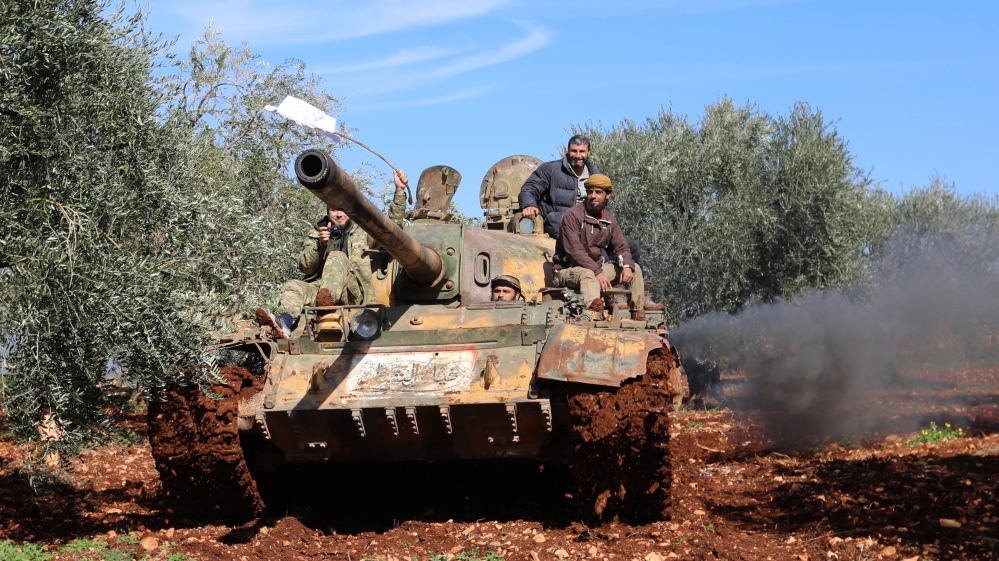Shelling on Syria’s Afrin kills six civilians; dozens wounded

Artillery barrage came a week after a suicide bomber launched an attack near a military base run by Turkey-backed fighters in Afrin.
A rocket attack on a northern Syrian town controlled by Turkey-backed opposition fighters killed six civilians and wounded more than a dozen people.
It was not immediately clear who fired the artillery shells on Thursday, but the attack came from a region where Kurdish fighters and Syrian government forces are present, said the Britain-based Syrian Observatory for Human Rights.
“Six people, including two children, where killed,” said the war monitor, which relies on sources in Syria for its reports.
Nearly 30 others were wounded, it added.
The shelling came a week after a suicide bomber launched an attack near a military base run by Turkey-backed fighters in Afrin.
The town has been under control of Turkey and its allied Syrian opposition fighters since 2018, following a Turkey-backed military operation that pushed Syrian Kurdish fighters and thousands of Kurdish residents from the area.
Since then, Afrin and surrounding villages have been the site of attacks on Turkish and Turkey-backed targets. Ankara considers Kurdish fighters who control a swath of Syrian territory along Turkey’s border to be “terrorists”, allied with Kurdish rebels operating within Turkey.
Turkey has carried out three military offensives in Syria, mostly to drive the Syrian Kurdish militia away from its border.
The White Helmets, a Syrian civil defence group operating in opposition-held areas, said the rockets also caused a fire in a residential area of Afrin that its volunteers put out.
In a White Helmets video, rescuers are seen pulling a burned, lifeless body from a damaged building as others are putting out a raging fire that also left a couple of vehicles charred.
Syrian Kurdish fighters were allied with the US-led coalition in the fight against the armed group ISIL (ISIS), which captured one-third of Iraq and Syria in 2014. ISIL was defeated and Kurdish forces have since created an autonomous administration in northeastern Syria, where a small US force is still based.
Also Thursday, the Kurdish-led forces reported an attempted escape from a prison in northeastern Syria that holds ISIL fighters. According to the report, inmates first started to riot inside Gerwan Prison in the city of Hassakeh, which houses about 3,000 prisoners.
This was followed by a car bomb that was detonated in a facility for storing and distributing petroleum products close to the prison. Clashes ensued with security forces in the area.
According to a statement by the US-led coalition, coalition aircraft provided support for the Kurdish-led forces, known as the Syrian Democratic Forces (SDF), which sustained casualties during the attack.
“Coalition aerial assets quickly began supporting operations to stabilize the situation through a coordinated strike against the hostile forces,” the statement said, without providing further details.
Under control
An SDF spokesman, Farhad Shami, said it was not immediately possible to confirm if anyone escaped from the prison. He said dozens of ISIL fighters who tried to attack the prison were hiding in neighbourhoods near the prison.
An SDF statement said they were believed to be hiding in residential homes and a security cordon was imposed on the area. It said the riots in the prison were under control.
Kurdish authorities run more than two dozen detention facilities scattered around northeastern Syria, holding about 10,000 ISIL fighters. Among the detainees are some 2,000 foreigners.
The Kurdish-led forces, backed by the US-led coalition, declared a military victory against ISIL in 2019 after seizing control of the last sliver of land the group controlled in southeast Syria.
Since, the Kurdish authorities have asked countries to repatriate their nationals, saying keeping thousands in crammed facilities is putting a strain on their forces. Prison riots are not uncommon.
The war in Syria has killed close to half a million people and displaced tens of millions since it broke out in 2011.






